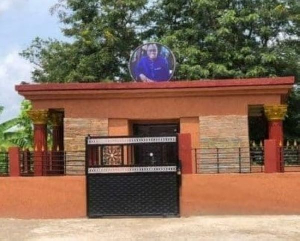Business News of Friday, 24 July 2020
Source: gna.org.gh
UCC signs MoU with Agrotech Ghana to operationalise Komenda Sugar factory
The University of Cape Coast (UCC) has signed a Memorandum of Understanding (MoU) with Park Agrotech Ghana Limited, a Ghanaian agri-business company to develop modalities for the operationalisation of the Komenda Sugar Factory.
The MoU, a copy of which was obtained by the Ghana News Agency (GNA) would be effective for three years from the date of the agreement between Park Agrotech Ghana Ltd and the Government of Ghana for the concession of the Komenda Sugar factory.
Processor Joseph Ghartey-Ampiah, outgoing Vice-Chancellor of UCC signed on behalf of the University while Mr Lalit Mishra, Managing Director of Agrotech Ghana Ltd signed for the Company.
The University, by the MoU, would among other things provide strategic technical and human resource support to produce sugarcane planting materials for the company and its out-grower for the sustainability of sugarcane production and its processing.
It would also provide land space to establish sugarcane field gene-bank and conserve the eight most relevant genetic resources of the crop in consultation with the company to serve as a source of explants for vitro propagation.
For its part, the Park Agrotech Ghana Ltd would provide infrastructure for the production of sugarcane planting material and breeding including a well-resourced state-of-the-art commercial Tissue Culture laboratory for the production of sugarcane plantlets.
The company would also provide funding for research, material, and equipment in critical areas such as Biotechnology and Tissue Culture, disease and pest control, soil fertility, agriculture engineering, food science among others.
Speaking at the signing ceremony, Professor Aaron Asare, Head of Department of Molecular Biology and Biotechnology at the School of Biological Sciences, College of Agriculture and Natural Sciences reiterated the University’s commitment to getting the Komenda Sugar Factory working.
According to him, Komenda and for that matter, the whole of the country was looking forward to the factory becoming productive adding that, the factory was a national asset and efforts must be made to operationalise it to benefit the citizenry.
There have been a series of concerns relating to the lack of adequate and right sugarcane for the Factory to operate at its maximum capacity since it was commissioned in May 2016.
It was expected that the revival of the factory would drastically reduce the importation of sugar and create indirect jobs for people in the sugar industry in every part of the country but that expectation was yet to be realised.
Because the factory required about 125,000 tonnes of sugarcane per day, which the current sugarcane production was nowhere near that figure.
In this regard, Prof Asare said UCC has since 2015 undertaken a series of research to produce high yielding sugarcane planting material to address the huge feed-stock deficit of the Komenda Sugar factory for its sustainability.
He said the University’s collaboration with Park Agrotech Ghana Ltd was as a result of its research and was highly optimistic that the collective capacities of the two institutions would make the factory productive with sustainable sugarcane to feed it.
Mr Mishra on his part said the partnership with UCC was very crucial as the company required quality planting material to produce sugarcane to feed the factory.
According to him, Agrotech Ghana Ltd would invest about $21M into the factory for four years.
Professor Ghartey-Ampiah expressed delight that after a long period of being idle, the Komenda Sugar factory would soon become operational to meet the aspiration of Ghanaians.
Entertainment











